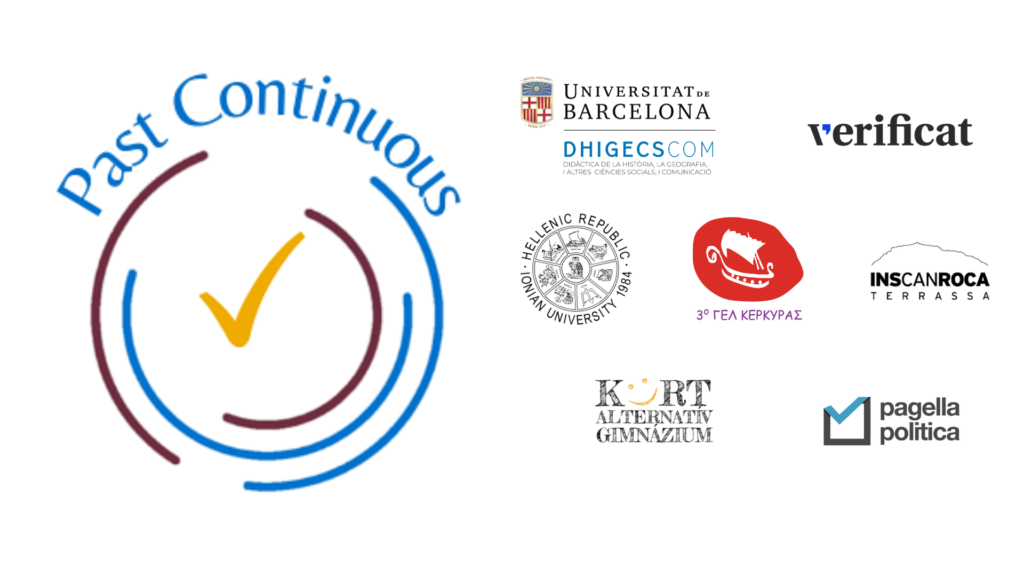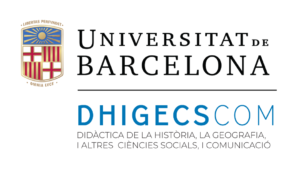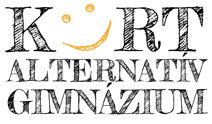Past Continuous – Digital Information Literacy innovating History School Curricula and learning delivery (Erasmus+ KA220-SCH – Cooperation partnerships in school education)
2023-1-ES01-KA220-SCH-000161144
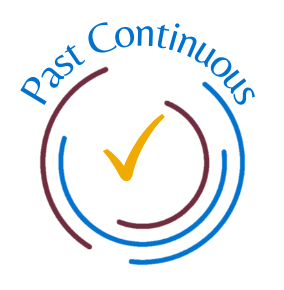
The Past Continuous – Digital Information Literacy innovating History School Curricula and learning delivery project, funded by the Erasmus+ KA220-SCH – Cooperation partnerships in school education program of the European Union, will be tackling the European Digital Information Literacy shortage in school education integrating it in history learning delivery.
The main aim of Past Continuous is to include digital information literacy skills into existing school education subjects instead of creating new one which does not fit with teachers timetables. The merge of digital information literacy with history lessons will address the innovation of history teachers’ curricula delivering an updated set of skills to analyse and compare texts belonging to past and current history equipping teachers with skills to forward to students.
In this sense, Past Continuous’ key elements are the following:
- Enhancing students’ skills connecting current digital information literacy skills with history lessons;
- Developing competences and tools for school teachers;
- Inform European school systems on how to include digital information literacy inside teachers’ curricula and initial trainings;
- digitalisation of teaching methods.
Background
Digital skills became a prerequisite for participation in learning, working and socialising, thereby accelerating the digital transformation. According to the International Computer and Information Literacy Study (ICILS) students entering upper secondary school system do not possess the most basic proficiency level in digital skills suggesting that a significant effort is necessary to reduce the share of underachievement in digital skills across all EU Member states for the EU-level target to be achieved by 2030.
Are Teachers ready to lead students’ digital upgrade in order to achieve the goals promoted by the Digital Decade (70% of citizens have basic digital skills by 2025) and the European Educational Area (less than 15% of eighth-graders across the EU should be low-achievers in computer and information literacy)? Teachers face hard challenges in delivering digital competences as the EU Framework for the Digital Competence of Educators stresses. The 2018 Organisation for Economic Co-operation and Development (OECD) study found that on average less than 40% of educators across the EU felt ready to use digital technologies in teaching, with divergences between EU Member States.
The digital skills’ issue at school is linked with the information literacy and disinformation. The majority of secondary school students are not able to assess the reliability of what they read online, to locate information and navigate autonomously. Algorithms used by social media sites and news portals can be powerful amplifiers of bias or disinformation, everyday exposure to digital data driven largely by inscrutable algorithms creates clear risks and requires more than ever critical thinking and the ability to engage positively and competently in the digital environment. Flash Eurobarometer 464 (2018) stresses the low trust in news published on online social networks (19%) and the high perception of running into online misrepresenting information (68%).
According to Digital Education Action Plan 2021-2027, school teachers and educators continue to play a vital role in empowering young people to benefit from and contribute to online debate and discussion as part of the democratic process. The Plan highlighted the importance of enhancing Media Literacy and critical thinking skills to raise awareness of risks related to the reliability of information sources; trainings should provide learners with the competences and values required “to access, interpret, produce and use digital information and other media content in a safe and responsible manner.
Several educational ventures have been proposed since the raise of shields against disinformation in 2015 (EUVSDisinfo) however, the direct introduction of digital information literacy delivery in formal education as a separate subject does not fit school teachers’ timetables making even inspired educational initiatives just cathedrals in the desert. Results show (Curriculum Overload; OECD) that an alternative best practice is to translate societal needs into cross-curricular themes and/or cross-curricular competencies and embed them into existing subjects or learning areas, rather than creating new ones.
Considering the backdrop outlined so far the Past Continuous project will provide a Teachers toolkit and a Virtual platform designed to merge history learning outcomes and digital information literacy skills’ acquisition in order to let school teachers gain the necessary competences to include current societal needs in ordinary school subjects (as to be equipped to avoid disinformation).
Objectives
The Past Continuous project will address the European needs described in the previous section by including digital information literacy skills in history lessons delivered in schools, pursuing the following objectives:
- Enhancing European upper secondary schools’ capacity to implement onsite, online and blended teachings for students connecting current digital information literacy skills with history lessons;
- Developing digital pedagogical competences and innovative tools for school teachers, enabling them to deliver high quality inclusive digital information literacy embedding the digital skills into history lessons and improve their continuous professional development;
- Inform European school systems on how to include digital information literacy inside school teachers’ curricula and initial trainings careers;
- Collaboration with digital technology providers and experts in educational technologies to develop digitalisation of teaching methods addressing digital readiness, fight against disinformation and manage an effective shift towards digital education in European upper secondary schools.
Past Continuous will achieve the objectives through the developing, implementation, testing and publication of:
- Teachers’ training course (toolkit): developing digital pedagogy in the use of digital tools for teachers (history education) improving their life-long learning by exploiting the European frameworks on digital competences of educators;
- E-Learning para estudiantes: desarrollando las habilidades y competencias digitales para los estudiantes, prestando atencE-Learning for students: developing the digital skills and competences for students paying attention to the female participation (According to female participation shortage OECD 2018);
- Guideline for European school leaders and policy makers on how to include digital information literacy skills in school teachers curricula and trainings.


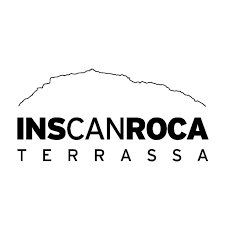
Coordinated by the University of Barcelona the Past Continuous Consortium brings together 7 institutions from Spain, Italy, Greece and Hungary, 3 schools plus associated partners and experienced organisations in History teaching, Digital information literacy and fact-checking.
The Past Continuous – Digital Information Literacy innovating History School Curricula and learning delivery project, funded by the Erasmus+ KA220-SCH – Cooperation partnerships in school education program of the European Union, will be tackling the European Digital Information Literacy shortage in school education integrating it in history learning delivery.
By implementing researches, surveys and 2 transnational meeting, one international training for teachers and 4 local pilots providing innovative digital literacy skills applied to History Education to 200 School students and 40 teachers, the project will realise the following outputs:
i) Past Continuous Teachers’ Training Course (Toolkit).
Main result of the Work Package is the realisation of a Toolkit for Teachers delivering an innovative methodology and assessment tools to melt history lessons delivery and digital information literacy for European upper secondary school teachers.. El principal resultado del Paquete de Trabajo es la creación de un Toolkit para Profesores que ofrece una metodología innovadora y herramientas de evaluación para combinar la enseñanza de lecciones de historia con la alfabetización digital de la información, destinado a profesores de educación secundaria superior en Europa.
- Teachers will gain the necessary competences to transfer the Past Continuous topics, contents and methodology in the school environment;
- Teachers will gain tools and procedures to implement local pilots that target students and impact their digital skills;
- The transfer of topics and contents into a Toolkit in 6 languages (English, Spanish, Catalan, Italian, Greek, Magyar) will allow the promotion of a sustainable culture among European teachers.
ii) Past Continuous e-Learning for Students
- Realisation of an innovative Digital Tool in 6 languages allowing the learning delivery of history and digital information literacy combined;
- The e-Learning will achieve a smart and efficient system to deploy remote learning for the teaching of media & information applied to History as it will include also a self-evaluation questionnaire where students will be led to assess their competences in digital information literacy. The virtual game is tailor-made to evaluate young people on their capacity to spot fake news, to trace back to the source of information, to understand the info spread processes and the eventual reasons for misleading the reader.
iii) Past Continuous Guideline
- Realisation of a guidance to definitely transfer the innovation of methodologies, activities, tools, training scheme from the local level to the European one.
- The work mandatorily starts from the state of the art of the School settings at national levels.
- From a first collection of School settings for history delivery and digital skills in the fragmented countries’ framework (comparative report), a second part of recommendations for the effective inclusion of Past Continuous learning delivery and skills in national settings will be achieved.
- The Past Continuous Guideline will be extremely important for the sustainability of the methodologies and activities inside the the partnership and the promotion and transfer of methodologies to other schools in Europe, Universities, policy makers and School leaders.
News
Past Continuous Kick-off Meeting
Past Continuous Kick-off Meeting was held over 18-19 March 2024 by Pagella Politica facilities in Milan!
The event provided the chance to share an overview of the project, objectives, products, promotion and financial issues.
After a brief and friendly presentation by each partnership member, the Coordinator provided a detailed timeline of activities and milestones to be achieved as well as the pedagogical backbone and past experiences Past Continuous will informed with.
School teachers presented historical case studies related to nationl events in order to speed up the elaboration and realisation of the e-Learning and Toolkit which will see the collaboration of Ionian University, TFCF and Verificat. The organisations will support the realisation of the project products through an extensive re-elaboration of media literacy and debunking techniques in order to innovate History teaching in European secondary schools.
The meeting ended up with an enthusiastic assessment of the work plan and commitments exposed so far and a deserved dinner.
Keep updated on news!
Contact us
- Past Continuous – Digital Information Literacy innovating History School Curricula and learning delivery
- Phone
- www.ub.edu/dhigecscom/past-continuous/
The Past Continuous project – Digital Information Literacy Innovating History School Curricula and Learning Delivery (2023-1-ES01-KA220-SCH-000161144 / OID: E10209447), is funded by the Erasmus+ KA220-SCH program – Cooperation Partnerships in School Education of the European Union with a total granted amount of €250,000.00.

